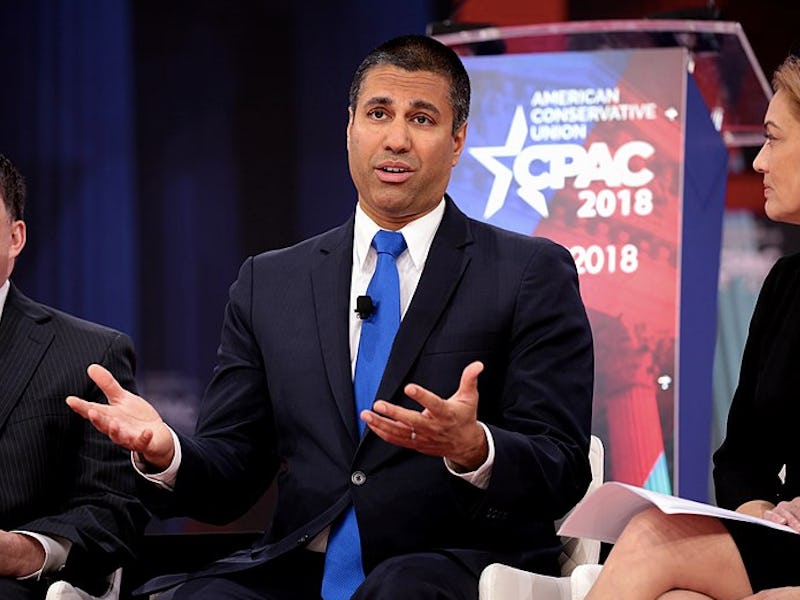Net Neutrality: The Complicated Reason the FCC Hasn't Repealed It Yet
Bureaucracy + Divided Congress = Nothing Happens

Democratic lawmakers announced Monday that they are moving forward to get the votes they need to pass a Congressional Review Act and save net neutrality provisions from being scrapped by the Federal Communications Commission (FCC).
Massachusetts Senator Ed Markey stated on Twitter that Democrats will file a petition to force a vote on the Senate floor on Wednesday, May 9. Subsequently, a vote could happen as early as next week, prompting internet activists to build an awareness campaign to encourage citizens to call their representatives.
Unfortunately, it’s just not that simple. Here’s why:
Technically, We Still Have “Net Neutrality” — For Now
As Democrats and activists rally the troops, it’s important to point out that the “Restore Internet Freedom” plan, as it’s been inaccurately titled, has not actually happened yet. The plan, which opens the door for internet service providers to conduct blocking, throttling, and paid prioritization of internet content, was slated to be a done deal on April 23; two months after it was published in the Federal Register. But Pai has left large portions of the plan in need of approval of the Office of Budget Management before it can take effect. Because the Pai is asking for transparency from ISPs about their business practices under the new plan, the changes need to be reviewed by the OMB before they can move forward. And we don’t know when that will be.
Considering how aggressively — and awkwardly — Pai had been pushing his anti-net neutrality agenda in 2017, the ambiguous feeling of the current state of the Restore Internet Freedom plan is surprising.
Dave Farber, an adjunct professor of Internet Studies at Carnegie Melon and a former chief technologist at the FCC, has one theory about the holdup. “I think it’s a combination of a bureaucratic (process) and a desire to not get in the middle of a riot,” he tells Inverse. “Mostly the FCC doesn’t want to get in the middle of a fight in Congress.”
With the 2018 election looming, and Congress controlling the FCC’s budget, Farber believes that Congress could be contributing to the slow turnaround on the plan. “Back years ago when the FCC did something that the Congress didn’t like, you couldn’t get a pencil at the FCC,” he says. “They have control over the budget.”
If and when the OMB does approve what’s needed to pass the Restore Internet Freedom plan, it then will head back to the Federal Fegister, for another 60 days. “Then they become official,” Farber says. “I’m not a lawyer, but then they become official provided there aren’t any lawsuits.”
And there are lawsuits — from state attorney generals as well as open internet activists. Basically, the enactment of the Restore Internet Freedom Plan is anybody’s guess.
What If the Plan Does Become Official?
When it comes to how ISPs are going to act once the new regulations go into effect — if they ever do — Farber believes that with roughly two years until a new administration could switch up who chairs the FCC, ISPs aren’t going to wade into any changes quickly. “I don’t think they’re going to do anything serious given the instability of the Congress, the election process, especially the fact that the FCC goes back and forth depending on the chairman, and the chairman depends on who the President is… I just don’t think if I were a big company, I’d want to take a chance.”
Dary Merckens, CTO of Gunner Technology, echoed Farber’s predictions that ISPs won’t take advantage of their regulatory freedom right away, when he spoke with Inverse last month. But Merckens, who specializes in JavaScript development for government and businesses, suspects it won’t take as long as Farber predicts. “It would be a PR nightmare for ISPs if they introduced sweeping changes immediately after the repeal of net neutrality,” he said, adding that they might wait six months. “Anyone who doesn’t think that’s realistic doesn’t understand how scummy ISPs are and how eager they are to use this newfound freedom to make tons of money.”
Congress Has an Uphill Battle
Regardless of what happens with Pai’s plan, for now, it looks unlikely that the Democrats will actually manage to pass a Congressional Review Act. Even if it does manage to pass in the House, it would have to be approved by President Donald Trump, who is unlikely to sign anything that counters the plans of Pai, his own FCC appointee.
However, the CRA has another benefit: It will force senators to take a public position on net neutrality. Senators will be thinking strategically about where they stand on virtually any issue. Net neutrality has proven to be uniquely popular on both sides of the ideological divide, so it will be interesting to see which anti-regulation lawmakers decide it’s in their best interests to side with Democrats interested in protecting an open internet.